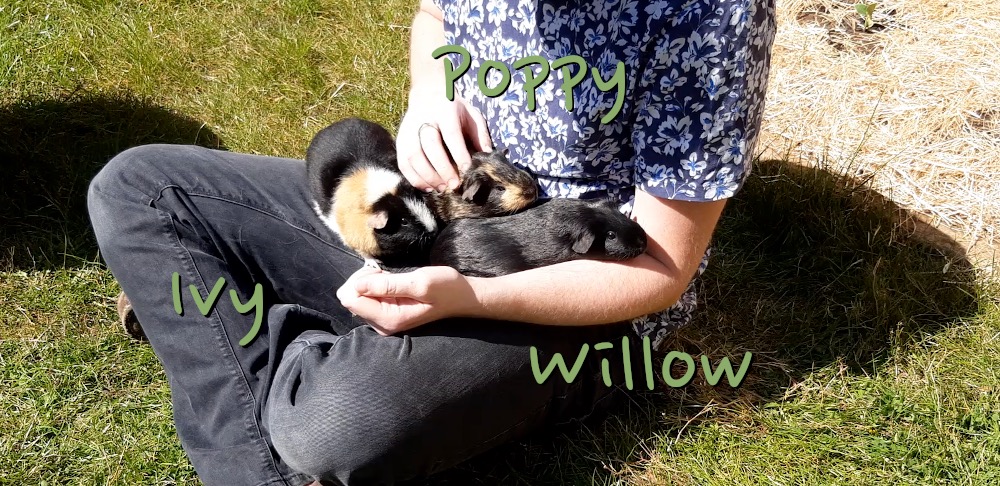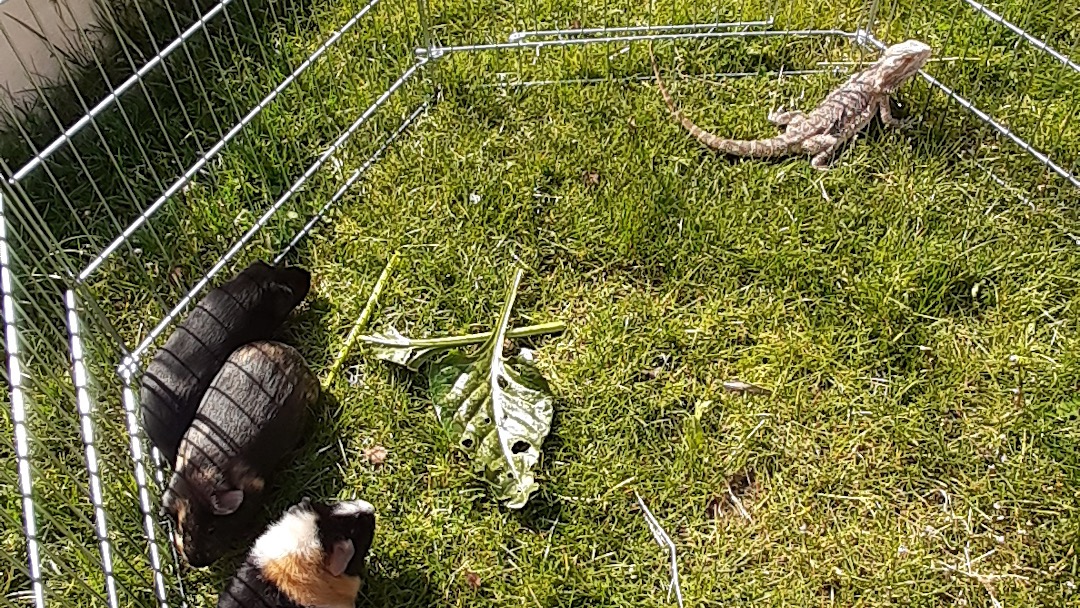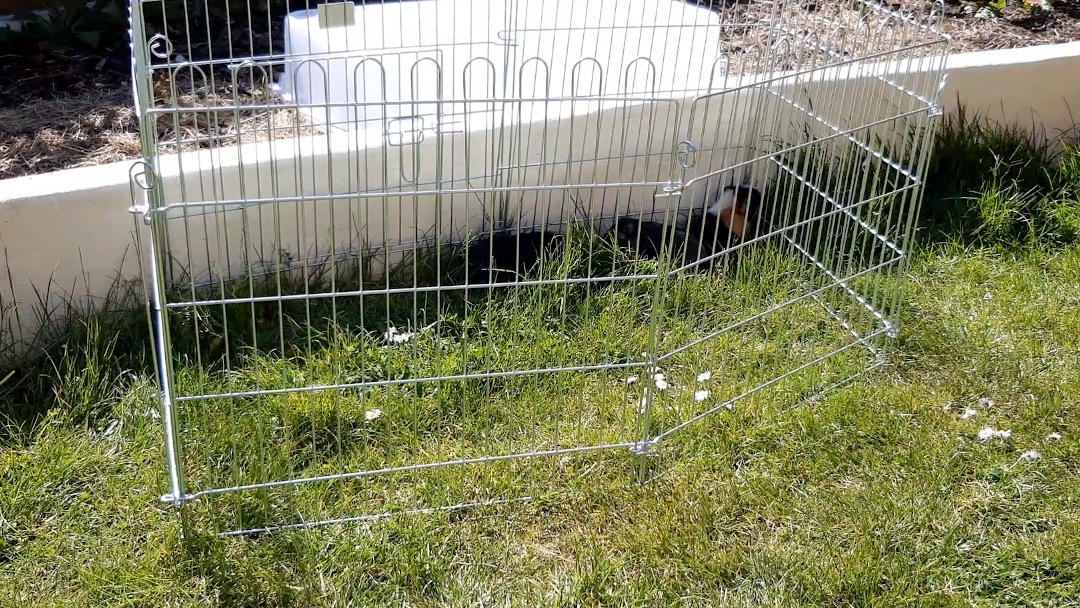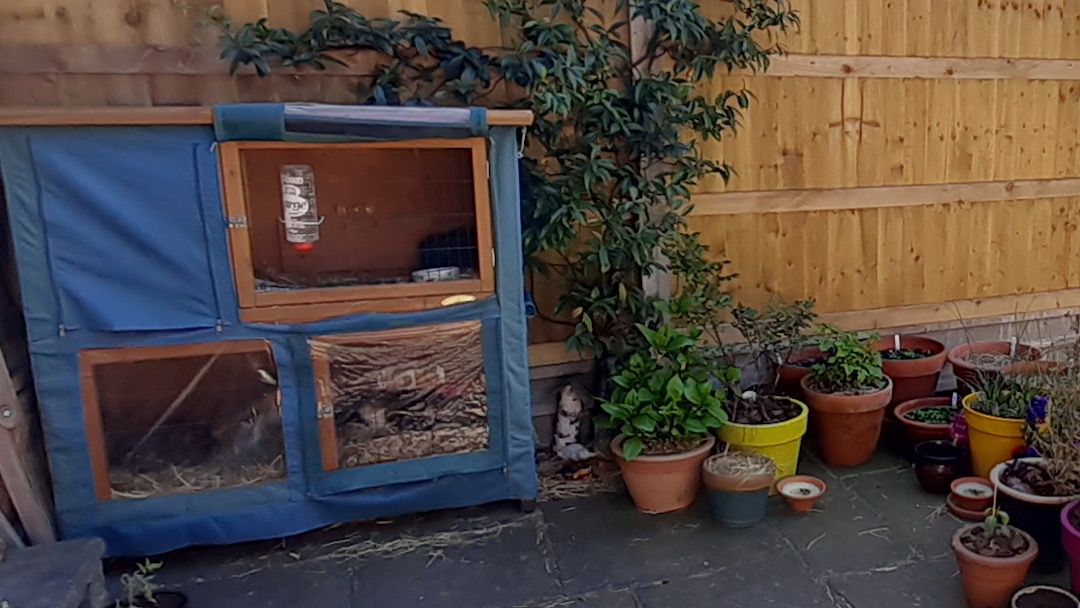Keeping Guinea Pigs
Joys & benefits
We have three Guinea pigs, meet Ivy, Poppy and Willow. They make wonderful pets. Not only are they very easy to look after, but you’re rewarded by their cheery “wheep wheep” sounds in the morning and a cuddle or two if they are happy enough to be picked up.

I always had Guinea Pigs (from now on called piggies) when I was growing up and I remember fondly sitting in the garden feeding them dandilions and moving their run around the garden so they have fresh grass to eat.
It’s only recently that we bought our house and have stayed in one place long enough to get some of our own. The reasons for getting them this time round are three-fold:
1. Happiness
For me, a garden without something enjoying it with you is a lonely place. Be it birds, bees or piggies, something is needed to make your garden feel alive. They are wonderfully relaxing to cuddle too… so long as you have given them enough time to get used to being held first. Our bearded dragon loves to sunbathe with them too:

Having something other than yourself to look after distracts you from other stresses for a short time and helps you get up in the morning.
2. Helping hands (Paws?)
I don’t want a pristine lawn. For me there should be little flowers and critters in your grass and cutting it back all the time is a pain. We also can’t use the strimmer up to my raised beds as it’ll scratch off the render, so I have to go around by hand.
Balls to that. Instead we bought a run which you can adapt to your desired shape. We move this around the edge of the garden and the piggies do all the hard work. Saves us having to feed them that day too.

Something like this would do the trick: https://www.meandmypets.com/me-my-pets-large-8-sided-folding-playpen.html
I’d recommend one that folds as flat as possible. Ours doesn’t and when we need to put it away, it has to be taken apart each time.
3. Mulch and fertiliser
The winning factor for me is the goodness that comes out of these eating machines. When fed grass, Guinea Pig food and the bits from our veg which we aren’t going to eat ourselves, they’ll supply you with an endless supply of mulch and fertiliser.
Their poos can be gathered, crushed up and mixed into water to make a liquid feed. The whole lot can go in the composter, to break down for the next season or spread it over your bed for a nutrient rich and fine mulch.

I used to mulch using fresh bags of hay, but the mulch which is created by the piggies has already been cut up into little bits which is so much easier to work with and it spreads easily. It’s also a little damp (sorry, gross) which means it’s less likely to fly away on a windy day. Not only that but its full of their manure so, when it rains or I water the garden, all the nutrients seeps down to the plant roots.
Not only THAT but it also saves money. We go through hay quickly, half on the veg as mulch, half for the piggies. Now I use their left over bedding instead. I now don’t need to buy mulch (saving ££££’s’).
Caring for them
I’m not an expert so you should always do your own research when buying animals. However, for us, so long as the following steps are taken, they will be clean, healthy and happy:
- Housing: A nice big hutch for them to stay safe and away from the elements. Ours has two layers, so they can get a bit of excersise and run around. It takes up more vertical space but that’s usually better than the base being larger. If you live in a particularily cold place and intend on bringing the hutch indoors over the winter, keep this in mind when buying your piggy housing.
- Enrichment: Give them something to climb on, run through or chew on. Ours have a few little tunnels and some wooden shapes which we can put treats in for them to kick around.
- Food & water: Pet shops or online suppliers will stock their recommended food and ensure they are getting all the nutrients they need. If you suppliment this with your own produce offcuts, they should get everything they need to stay healthy. Ensure they have easy access a clean (replaced daily) water supply.
- Warmth: Newspaper for the base, It’s an excellent insulator and it also keeps the base of the hutch dry for longer. On top of this, pile on plenty of hay or woodshavings. We use hay because of the mulch created. You can pick up newspaper for free at train stations or ask your friends to keep them aside for you…. just make sure to take any staples out. Ensure the bedding is replaced when it’s looking either dirty or thin (they have eated it all). We also have a cover on ours which we can zip up on a windy day or cold night. In the summer these hutches get pretty hot. Consider putting it in a shaded spot (we have ours under our jasmine) and we freeze some bottles of water, wrap them in a towel and pop them in the hutch for them to sit on.

For the community
There’s a lot of newspaper wastage after cleaning out the hutch. Does anyone have any good usages of this? We tried to use it to protect the soil by laying it down to smother weeds, to then mulch on top, but something (I suspect the foul play of foxes) kept digging it up. I assume because it smells like a tasty meal for them.
Do you pop it in your composter or simply throw it away? Please add your thoughts in the comments.
Why they are great:
- Easy to look after
- Will eat your left overs and produce fertilizer
- Can keep your lawn in order
- Who doesn't love stroking an animal?
- They make the most adorable noises when happy
- Can live outside (if you keep them nice and warm)
- Their bedding can be used as mulch
- Inexpensive
- Vet bills are minimal
To keep in mind:
- You will need to clean out their hutch when it gets dirty
- You'll need a steady supply of hay and newspaper
- You'll need at least two
If you already have Guinea Pigs then you may have learnt a few new ways that they can benefit your garden. If you’re hoping to get a pet to benefit you and your garden, these little fluffballs are perfect.
If you enjoyed this, you may also enjoy Mark’s (Self Sufficient Me) video on keeping small animals: https://www.youtube.com/watch?v=jkWWB9O2wQ8
Article written on Apr 19, 2020
Updated Apr 20, 2020